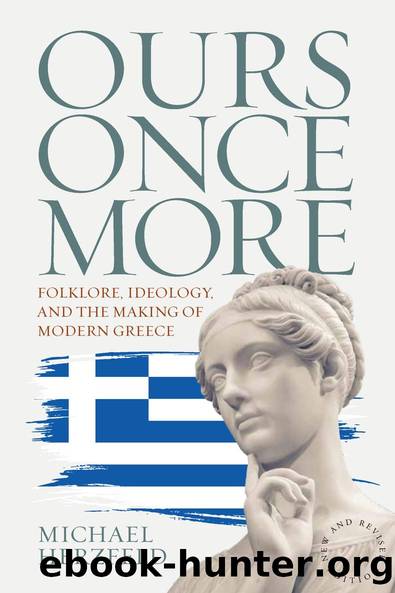Ours Once More by Michael Herzfeld

Author:Michael Herzfeld [Herzfeld, Michael]
Language: eng
Format: epub
Tags: History
ISBN: 9780918618320
Google: Vh-4DwAAQBAJ
Barnesnoble:
Goodreads: 923434
Publisher: Berghahn Books
Published: 1982-05-01T00:00:00+00:00
Vivilakis: A Scholarly Response
Lelekosâ works, although largely devoted to songs, contain a limited amount of other material, such as dialect forms, descriptions of customs, and proverbial phrasesâa somewhat uneven miscellany. Here, too, a major classificatory problem lurked, as yet unformulated: how could the rapidly increasing laographic corpus be organized so that materials of different kinds might be separately recorded but efficiently cross-referenced? The scope of Lelekosâ interests did not extend to tackling this issue. Others, however, had already begun to deal with it, on the basis of selectional criteria that had once again largely originated in the antiquarian scholarship of Western Europe.
The title of Douglasâ Essay on Certain Points of Resemblance between the Ancient and Modern Greeks spells out the main organizing focus of this endeavor. His account, however, was not a systematic collection; it represents a rather haphazard search for ethnographic evidence, although the search for identifiable parallels certainly acted as a filter through which the experiences of Douglas and other travel-minded authors could be sifted.
In Germany, however, more thorough ethnological research soon began, notably the remarkable work of a Greek scholar. In 1840 in Berlin, Emmanuel Vivilakis (Bybilakis), a Cretan who had lived through the War of Independence in Greece, published a short but significant treatise on parallels between ancient and modern Greek life. His aim was explicit:
⦠to make an accurate comparison of the manners and customs of ancient with those of modern Greece, and therein to provide irrefutable proof not only that ancient Hellas is as yet far from defunct but that, just as these customs dwelt in her millennia ago, so today they live on in her childrenâs children; that the preservation of the same manners and customs would have been impossible had there taken place at any one time a complete interruption in the existence of this people (Volk); finally, that the assertions of certain individuals (their number is fortunately quite negligible) are quite as far from the truth as heaven from earth, when they publish its very opposite hÅs ek tripodos (âas from the [oracular] tripod [of the ancients]â), âin order,â as they say, âto rescue educated Europe from the erroneous views it has held heretofore concerning the descent of todayâs Hellenes from the ancient Greeks.â (1840: viiiâix)
This first real salvo from the Greek side both anticipates Lelekosâ works chronologically and surpasses them in scholarly sophistication. The reference to Fallmerayer is quite unambiguous, and the irritation over his attempt to divide âGreeceâ from âEuropeâ stands out sharply.
Vivilakisâ argument, clearly and simply described in a brief introductory passage, is worth quoting in full:
The material for comparing the modern Greeks with those ancestors who inhabited the same places three millennia ago, in relation to their manners and customs, religious festivals, etc., offers itself to us in such rich abundance that it almost causes us embarrassment, not as to how but as to what material we shall begin to solve our task with.
It would seem expedient to us to begin our descriptions with the birth of
Download
This site does not store any files on its server. We only index and link to content provided by other sites. Please contact the content providers to delete copyright contents if any and email us, we'll remove relevant links or contents immediately.
Cecilia; Or, Memoirs of an Heiress — Volume 1 by Fanny Burney(32527)
Cecilia; Or, Memoirs of an Heiress — Volume 2 by Fanny Burney(31928)
Cecilia; Or, Memoirs of an Heiress — Volume 3 by Fanny Burney(31915)
The Great Music City by Andrea Baker(31898)
We're Going to Need More Wine by Gabrielle Union(19020)
All the Missing Girls by Megan Miranda(15887)
Pimp by Iceberg Slim(14464)
Bombshells: Glamour Girls of a Lifetime by Sullivan Steve(14037)
For the Love of Europe by Rick Steves(13806)
Talking to Strangers by Malcolm Gladwell(13329)
Norse Mythology by Gaiman Neil(13314)
Fifty Shades Freed by E L James(13215)
Mindhunter: Inside the FBI's Elite Serial Crime Unit by John E. Douglas & Mark Olshaker(9289)
Crazy Rich Asians by Kevin Kwan(9261)
The Lost Art of Listening by Michael P. Nichols(7475)
Enlightenment Now: The Case for Reason, Science, Humanism, and Progress by Steven Pinker(7287)
The Four Agreements by Don Miguel Ruiz(6727)
Bad Blood by John Carreyrou(6599)
Weapons of Math Destruction by Cathy O'Neil(6248)
